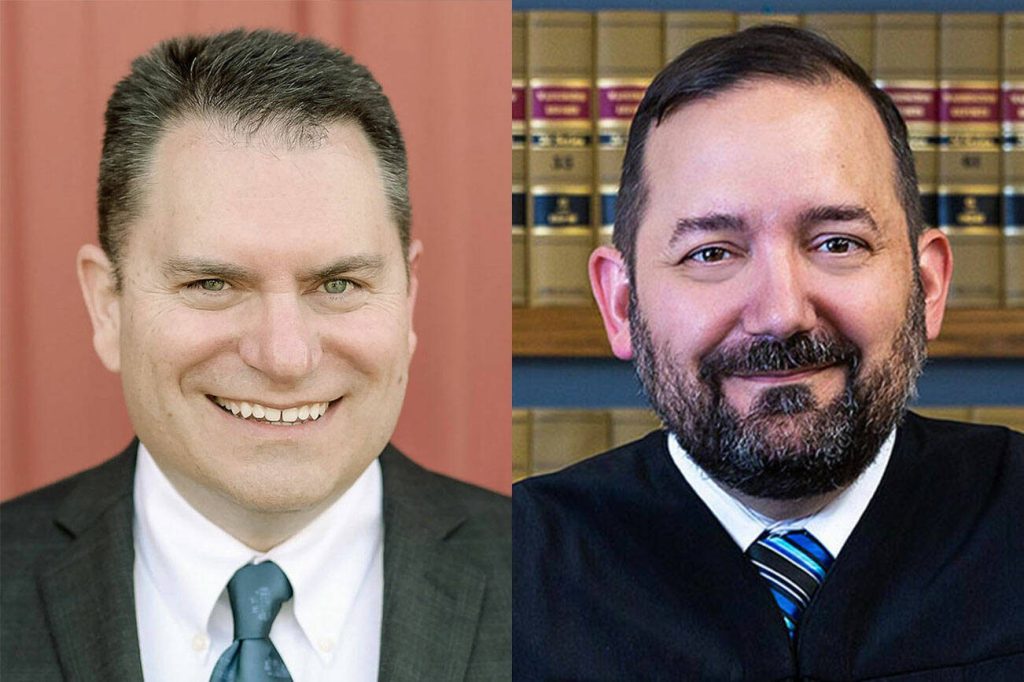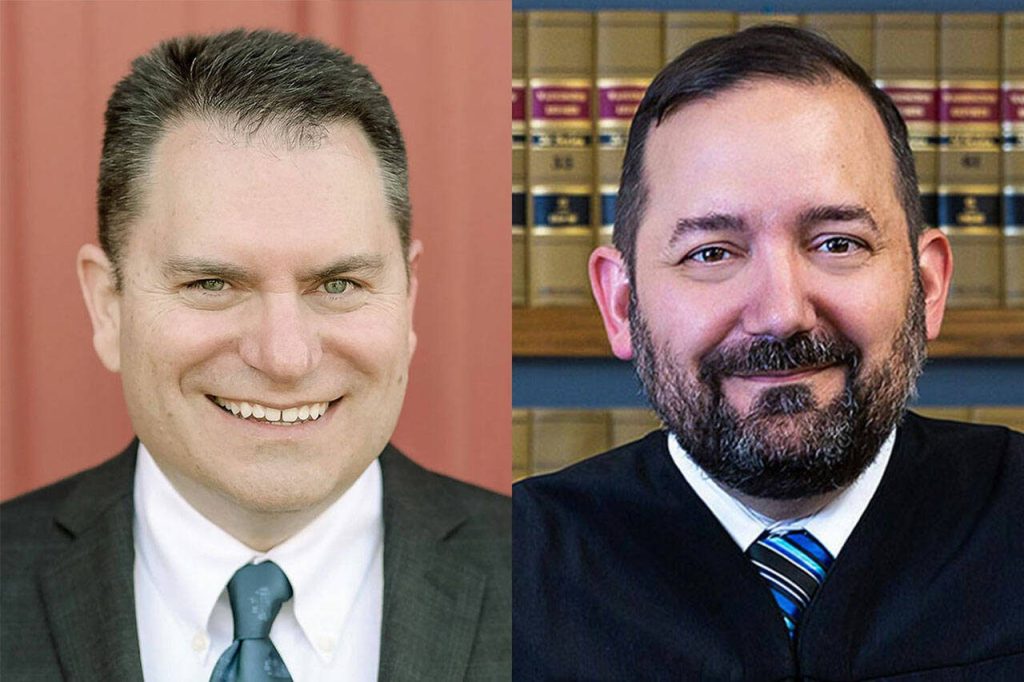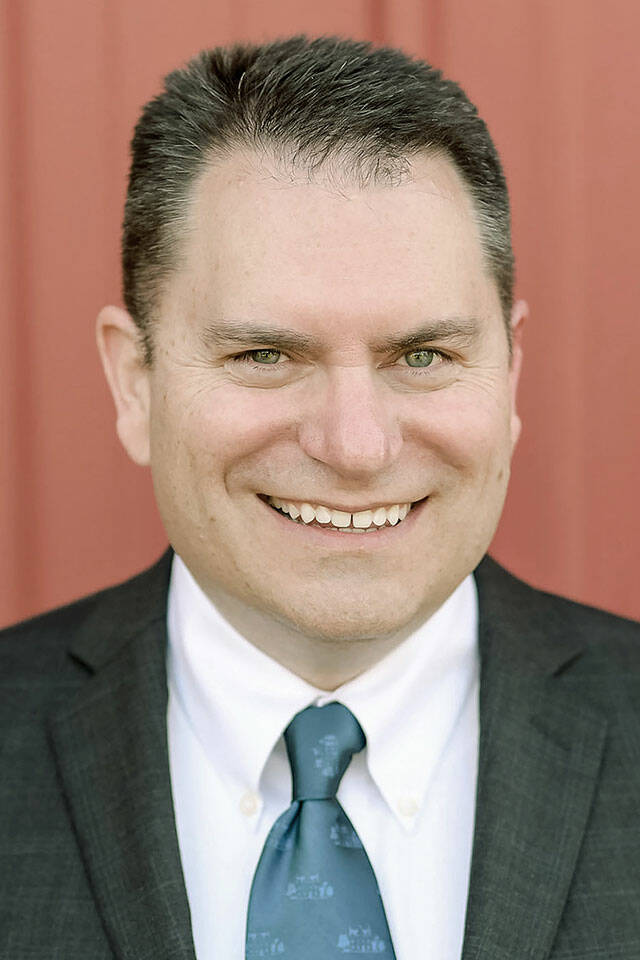Former cop, skeptical of appointees, challenges incumbent for judge
Published 1:30 am Thursday, November 2, 2023



EVERETT — What does it mean for a judge to be impartial?
For incumbent Snohomish County Superior Court Judge Miguel Duran, a judge must ensure the court is informed and working properly, regardless of their personal feelings.
His challenger, Brett Rogers, believes a judge cannot be impartial if they are appointed by politicians.
Duran is a former criminal and civil defense attorney. Rogers is a lawyer and former police officer who ran as a Republican for Snohomish County prosecutor and state attorney general, finishing third in the 2020 primary for the state office.
Snohomish County Superior Court judge Position 16 is a nonpartisan position.
Seats 16 and 17 are the only judicial positions up for election in Snohomish County Superior Court. Seat 17 also has two candidates: incumbent Judge Patrick Moriarity and Mary Anderson.
Miguel Duran
Appointed in 2022, Miguel Duran is still the “new kid on the block” serving on the county Superior Court judge bench, he said in an interview with the Daily Herald.
Duran, originally from Corpus Christi, Texas, worked as a defense attorney in both civil and criminal cases for 22 years.
“I love doing both, but I found that I wasn’t a fundamentalist,” Duran said. “I wasn’t somebody who just believed wholeheartedly that the defensive role is right, and prosecutors that are playing this role is wrong.”
Duran worked as a civil litigator with Seattle-based Wilson Smith Cochran Dickerson starting in 2019, where he co-founded the firm’s Diversity, Equity and Inclusion Committee. He worked as a trial attorney for Allstate and on employment disputes for Service Employees International Union Local 925. From 2008 to 2013, he was a public defender in Everett and Seattle.
Duran also served as a judge pro tem, or temporary judge, in Everett Municipal Court for six months prior to his appointment.
As a Superior Court judge, Duran has experienced “a little bit of everything,” overseeing adoptions, divorces, juvenile court and criminal cases.
“It has just been a wide array of experiences and it’s great,” Duran said. “If you’re intellectually curious, which I think all judges really need to be, you are never going to stop reading. You are never going to stop learning. Every week is going to be something new that you won’t have encountered before.”
As a judge, Duran values making the court more accessible to those historically excluded and ensuring public trust.
“We need to show that we’re fair and we need to actually put ourselves in uncomfortable positions,” Duran said.
Brett Rogers
Brett Rogers, a Lake Stevens resident with Wisconsin roots, served as an officer, sergeant and lieutenant in the Seattle Police Department while getting a law degree from Seattle University.
Rogers declined an interview with the Herald unless he wins the election.
A fatal police shooting changed the direction of his life, pushing him to go to law school, he said last year. In 2002, Rogers and another officer shot and killed Shawn Maxwell. The officers said Maxwell was wielding a sword.
In his two decades of law enforcement experience, Rogers gave no “preferential or detrimental treatment for any reason,” he wrote in his voters’ pamphlet biography.
On his state bar association profile, a registered firm or law office is listed as “not specified.”
The candidate has run for several positions in public office in recent years.
Last year, Rogers lost to Prosecutor Jason Cummings by about 28,000 votes. In 2021, he lost a tighter race for Lake Stevens school board. And in 2020, he took 12% of the primary vote for state attorney general.
In his run for prosecutor, Rogers advocated for the office to more quickly charge suspects with crimes, push judges for higher bail and argue for heftier sentences.
Rogers has publicly criticized his opponent for being appointed by the governor, calling it “problematic” in our “current hyper-partisan climate.”
“It does our democratic process a great disservice by allowing a single person — the governor — to determine the make-up of a significant portion of the judicial branch,” Rogers wrote in his statement for the voters’ pamphlet.
Duran brushed off Rogers’ criticisms, stating his commitment to the profession is what got him to the bench.
“It wasn’t a decision they just made in a vacuum because they thought, for whatever reason, I was a good choice,” Duran said. “It’s a matter of having put in the work to show that you care about the profession, that you have experience in the profession, that other people in the profession value your judgment.”
Rogers pledged to uphold the“Federal and State Constitutions.” Article IV, Section 5 of Washington’s Constitution reads: “If a vacancy occurs in the office of judge of the superior court, the governor shall appoint a person to hold the office until the election and qualification of a judge to fill the vacancy, which election shall be at the next succeeding general election, and the judge so elected shall hold office for the remainder of the unexpired term.”
Rogers wrote in the voters’ guide he can earn public trust and “fairly consider facts” better than his opponent.
“During this time when so many laws are changing so quickly, we need judges who are committed to the independence of the judicial branch, who recognize that government derives its power from the people, and who are willing to consider reasoned challenges to laws, rules and regulations,” Rogers wrote.
Ballots are due Nov. 7.
The Daily Herald spoke with Duran this month. Rogers declined to talk with a reporter. Here are excerpts from Duran’s interview.
Do you think having empathy and humanity is important as a judge when speaking to families, jurors or victims of a crime?
Duran: Yes, to a point. I think you have to be really careful with that. I think I’m a fairly empathetic person. With jurors, I think that you always have to be cognizant of the fact that if you’re being too empathetic with one group of people, you might be losing the neutrality that you’re supposed to have overall in your position. I’m dealing with people in my courtroom — whether it’s criminal or civil or family law — it’s almost always, unless it’s an adoption, one of the worst days of their lives. And so I try to be empathetic to a point because of that, because I know it’s going to be hard and frightening for them. And I try to be gentle in terms of how I explain myself.
Both as a judge and an attorney, is it hard to handle the emotional and mental weight of the harder cases you see in the courtroom?
Duran: As an attorney, it was definitely difficult because it’s very hard to separate yourself from it. I have nothing but respect for both prosecutors and defense attorneys on the criminal side. If you’re a prosecutor, you don’t want to see a criminal get back on the street. If you’re a defense attorney, you are terrified of having an innocent client go to jail or prison.
As a judge, the weight isn’t as heavy. I mean, I still feel the responsibility. But when it comes to these criminal trials, for the most part, my job is just to instruct the jury on the law. I just have to make sure they have the right instructions, and that both sides have the opportunity to properly present their cases. Whatever the jury decides, that’s out of my hands. Even though as a human being I care about the outcomes, and I have my own personal feelings about it, as a judge, it’s very simple for me to say, ‘You know what, I just need to make sure the system works, and that I’m doing my part of it, and that these jurors feel safe and have the right information in front of them.’ And then whatever the result is, I can live with that.
Maya Tizon: 425-339-3434; maya.tizon@heraldnet.com; Twitter: @mayatizon.







